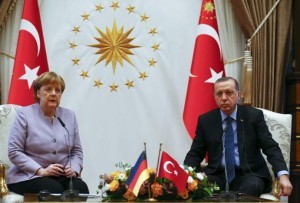On June 29, the German government denied Turkish President Recep Tayyip Erdogan’s request to hold a rally for Turkish Germans on the sidelines of the G-20 summit in Hamburg. German Foreign Minister Sigmar Gabriel called Erdogan’s request “not a good idea” and added, “We do not have the intention to allow that other countries’ domestic conflicts be imported into our population.”
Former European Parliament Speaker Martin Schulz was even more forceful than his fellow German. Schulz called for an outright ban on Erdogan’s rallies. Schulz said, “Foreign politicians, who [trample] our values at home, must not have a stage for speeches in Germany. … I do not want Mr. Erdogan, who is holding dissidents and journalists in Turkey, to hold large-scale events in Germany.”
In response, Ambassador Huseyin Muftuoglu, the spokesman for the Turkish Foreign Ministry, called Schulz’s remarks “regrettable and unacceptable.” The Turkish government condemned the German politicians’ comments.
Erdogan and members of his Justice and Development Party (AKP) like to hold rallies in Europe because European Turks often vote for the ruling party.
The latest row between Ankara and Berlin comes in the wake of other serious problems in Turkish-German relations. Last March, in the run-up to Turkey’s April 16 referendum on establishing an executive presidency, European governments — especially German municipalities — denied AKP leaders from holding meetings with the Turkish diaspora communities there. At the time, Erdogan had accused Germany and other European countries of “Nazi practices” in a serious breach of diplomatic etiquette.
Verbal spats undermine cooperation over high-level issues as well. For more than a year, the Turkish government has barred German delegations from visiting German troops at Incirlik Air Base conducting operations against the Islamic State. The problem emanated from the German parliament’s June 2016 vote recognizing as genocide the forceful deportations and massacre of Ottoman Armenians during World War I. Failing to resolve their differences, Turkey forced German troops to leave Incirlik and move their operations to Jordan in early June.
To be sure, as Al-Monitor’s Semih Idiz pointed out recently, Turkey and Europe cannot just break off relations and walk away from each other. History, geography and economic interests require the two sides to rub elbows as often as possible. But one wonders how much worse Turkey’s relations with its Western partners will get before they get better.
In related news, the Washington Post reported June 28 that the Turkish government has asked Twitter to suppress Michael Rubin, a Middle East expert with the American Enterprise Institute in Washington and regular critic of Erdogan, from accessing the social network. In early June, Erdogan filed a criminal complaint in Turkey against Rubin over his alleged connections to the Pennsylvania-based Turkish cleric Fethullah Gulen, who is accused of masterminding last summer’s coup attempt in Turkey. Rubin has been a consistent critic of Erdogan and the AKP since the ruling party’s first term (2002-2007) and denies the allegations.
Ask me anything
Explore related questions





